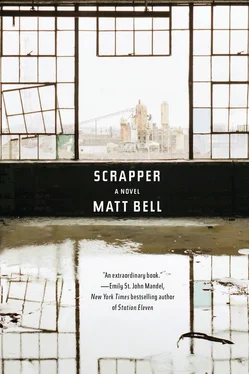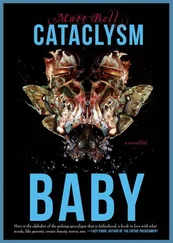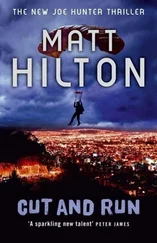Their conversation was allotted ninety minutes but it did not last ninety minutes. The rapper believed Adnan had made only a small mistake, despite the events that followed. A paperboy. His crimes were indirect, passive. The rapper expected his help to be welcomed but soon it was clear this wasn’t the case. The rapper thought he was angry for his own reasons but when confronted with Adnan’s anger his reasons withdrew, childish and petulant.
The two men took turns talking but the conversation was frustrating from the start.
The rapper said, I’ve come to ask for your cooperation. I want to make a movie about you, to bring attention to the problem of your detainment, your treatment. How you are cleared for release but haven’t been released. The government hasn’t said yes but they will. They wouldn’t have brought me here otherwise.
Unless, Adnan said, they brought you here so I could discourage you.
Already Adnan looked disappointed. The rapper continued, speaking faster: I want your name to be on the lips of outraged citizens, calling for your release. I want the president to hear them calling your name.
The president of the United States already knows my name. I know this. He thinks of me while he lies in bed at night. About what he ordered done to me.
It isn’t the same president now, the rapper said. The president who had you tortured isn’t president anymore.
There is only one president, Adnan said. You vote or don’t vote, it makes no difference. There is just one president.
You’re wrong. Every president is problematic but this president is different.
Adnan leaned back in his chair, lifted his chained hands in an apology, one he couldn’t have meant. Their time was short. This wasn’t what the rapper had come to speak to him about. He needed permission, access. It would be impossible to speak to Adnan again as long as he was in the detention camp but they couldn’t silence him forever.
They can, Adnan said. They have.
Adnan said he didn’t want to die but his hunger strike was already one hundred days old. Every day the guards came, strapped him into a restraint chair, used it to prevent him from forcing himself to vomit. Fifteen hundred calories in two blue-and-white cans. They’d tortured him ten years ago and they were torturing him again, this time with nasal tubes and lubricant and nutritious slime. Adnan gestured again, invited a survey of his body. The chains on his hands and feet, the anonymous clothes. The scarring and irritation of his nasal passages, his throat. How he was losing his voice because he was so rarely allowed to speak freely.
Adnan asked, How old are you?
Thirty-three, the rapper said.
Thirty-three. I’m thirty-three too.
I know. Your age was one of the reasons—
You want to think we are the same.
Yes.
We are not.
I know.
Thirty-three. Your country at war a third of your life.
Yes.
And I have been imprisoned a third of mine.
Yes.
In your country, if I had shot a man in my youth, could my crime be almost an accident, an inevitability, an unavoidable outcome of a system?
Some people would say so. Some people would say all those things.
A crime, yes, but the crime of having been younger, less educated, less patient. There would be those who would protest my harsh treatment.
Yes. A killer but a killer at a disadvantage.
Material support. That’s my crime.
The rapper wanted to speak but couldn’t. He had come to see a wronged man speak in his own defense but what was he getting instead? His sympathy unfairly played against him.
Adnan continued: Material support. I moved money. I was poor and my father was dead and I was twenty-one years old and I was angry at the country the old men said killed my father and the old men said Vengeance and they said Your anger is righteous and they said God is on our side and they said The feelings you carry are true feelings and they said You do not have to hurt anyone and they said We only need you to help us move money .
The rapper whispered, Don’t say this. They can hear you and they will never let you go.
Already they will never let me go, Adnan said, so what does it matter if I speak the truth? I was young and ignorant and I wanted to do something to end my fear. I was afraid because I was angry and I wanted to end my anger too. I am still angry but the guards now are not the guards of my youth. They no longer strike me. They no longer beat me awake. They do not know the short shackle or the waterboard. They let me wear my clothes, let me see the sun, let me read my books and pray my prayers. They do not let me starve myself but they believe this a kindness. The men who tortured me are long gone, gone home to America or back to Iraq or Afghanistan, and I do not resist those who have taken their place. Every soldier is not the same soldier. The men I hate I will never see again but I wait for their names to be spoken. In their absence I will hate no one else.
The conversation was allotted ninety minutes but it did not last ninety minutes. The rapper walked around the table to knock on the door and signal the guard, then returned to his own seat. Before the detainee was taken from the room he tried again to speak to the rapper but now the rapper wouldn’t listen, couldn’t meet his gaze. Their conversation did not end with goodbye, and later the rapper would find he did not believe the conversation had ended.
Once back in the States the director explained her new intent: a white room, a restraint chair, the standard operating procedure for force-feeding hunger strikers. She did not speak in the vernacular of the military. She never said detainee , only prisoner , only victim . She did not say detention center , only prison , only torture, violation of free will, civil rights .
The rapper did not need the argument. The rapper had already volunteered.
The rapper arrived in the white room, dressed in the orange jumpsuit the crew provided, allowed them to chain his hands and feet. The surprising weight of the cuffs. The rapper shoeless, hatless. He sat down in the restraint chair, wondered briefly where the crew had acquired the equipment. They strapped the restraints around his hands and feet, the chair cold against his sweating skin, then fastened another strap across his forehead, holding his skull angled backward. Then the nurses hired to play nurses, then their teal scrubs and purple latex gloves, the measuring of the feeding tube, ear to xiphoid process. The rapper had been instructed to stare straight ahead into the camera but he couldn’t resist a glance to the side, to watch the purple gloves coating the end of the feeding tube in lubricant. Once he saw he couldn’t unsee. Then the purple glove across the forehead, the thumb opening his nostrils. The tube slipped in, pushed past. The rapper squirming in the chair, another set of gloved hands gripping his head to hold him steady. He heard himself groan, heard himself grinding his teeth. He tried to keep his mouth closed but the tube was bypassing the mouth altogether. There were tears in his eyes and who wouldn’t cry at this, how could anyone not. Another inch of tubing, his head thrashing side to side, and the purple gloves kept working. Inch after burning inch. How to know how many inches had gone in? His eyes were closed and he couldn’t open them to check. The unbearable burning increasing. The tube wasn’t anywhere near his brain but his brain was what burned. Arching his back didn’t provide any reprieve but when he wouldn’t stop bucking a third nurse came to hold him down, this one’s hands ungloved. One of the rapper’s arms pulled free of the restraint strap and the ungloved nurse pinned his freed hand to the armrest, applied strength against frightened force.
Читать дальше












